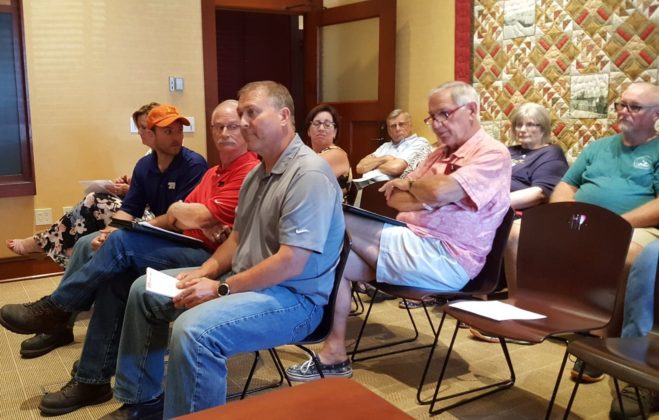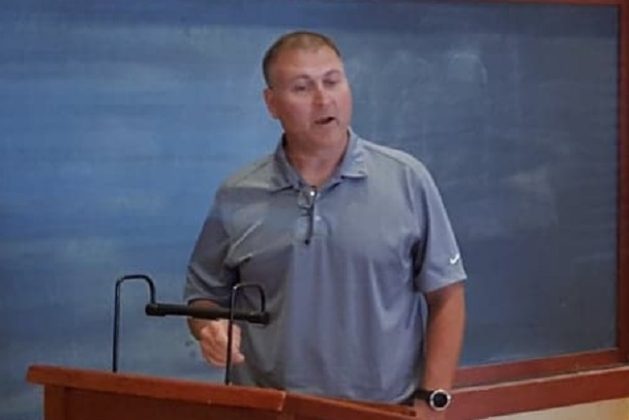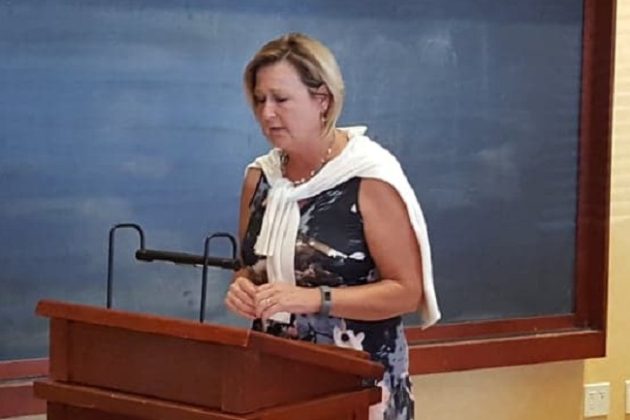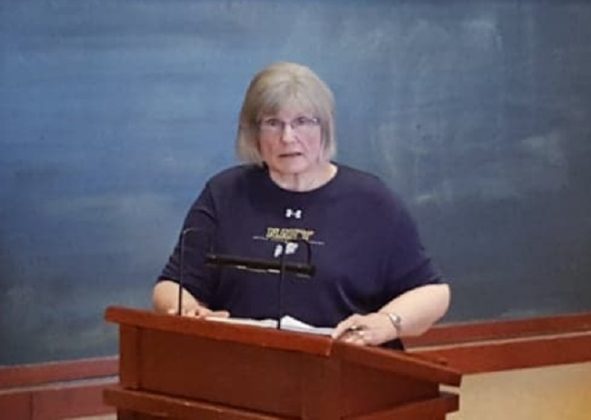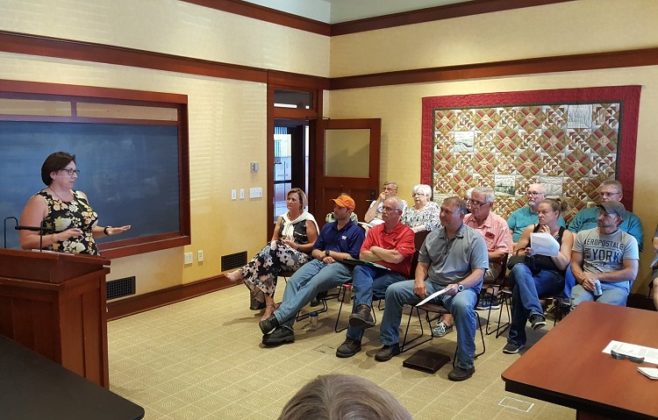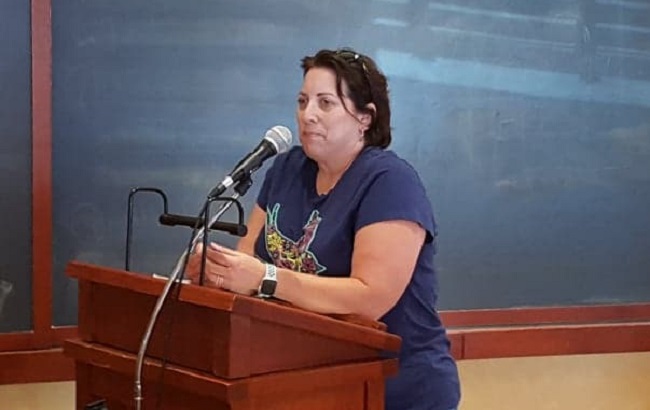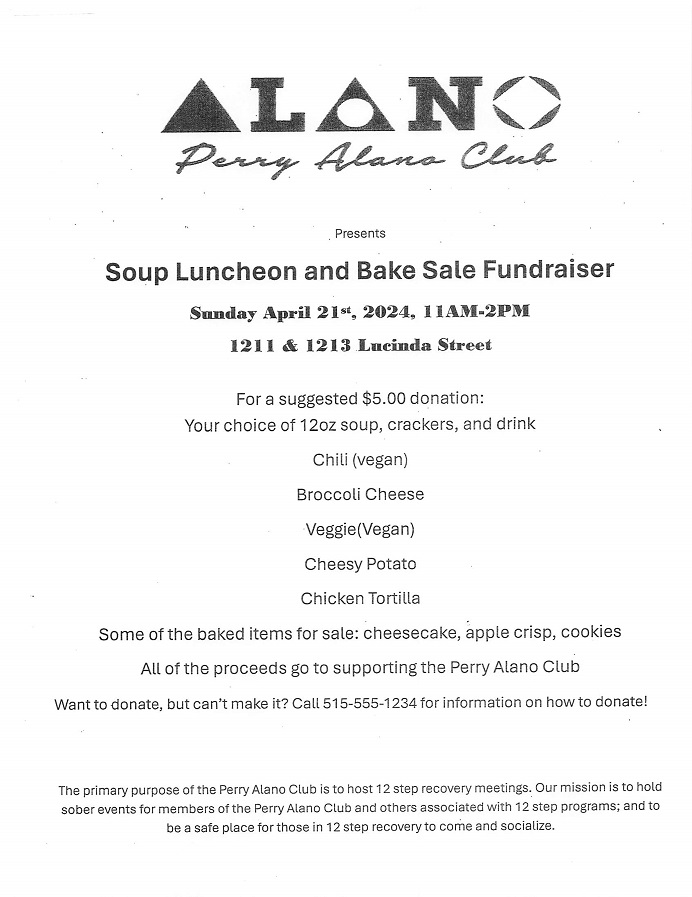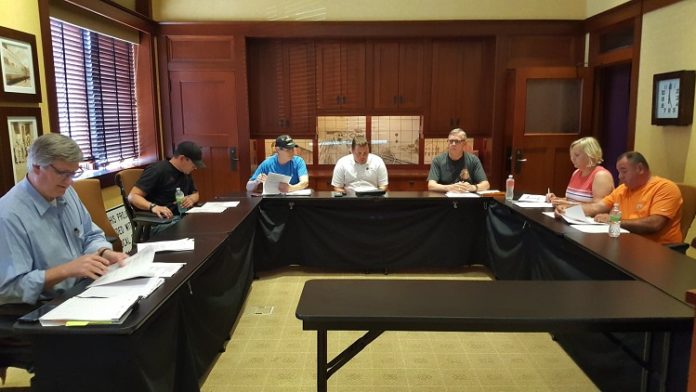
The Perry Planning and Zoning Commission met July 16 and voted six to one to recommend to the Perry City Council that the city vacate one block of Second Street next to the Progressive Foundry Inc. in order to facilitate the foundry’s expansion and improve public safety.
The meeting included three back-to-back public hearings on zoning changes, and these hearings gave both advocates and opponents of the city’s vacation plan and the foundry’s expansion plan a chance to ask questions and make statements about the proposed street closure and related changes, such as the increase in production also planned at Wiese Industries.
Both factories produce parts primarily for agricultural equipment. The Progressive Foundry at 1518 First Ave. produces cast-iron products, and Wiese Industries at 1501 Fifth St. produces drop-forged steel products. The foundry employs about 100 people and Wiese about 50. Each of the factories has been a fixture of the Perry economic landscape for more than a century.
Half of the 15 people attending the July P&Z meeting live in the residential neighborhood around the factories. These neighbors seemed most concerned about the likelihood of increased noise, air pollution, traffic congestion and loss in property values that expanded production at the factories might cause, while Perry P&Z Vice Chairperson Ron Leber opposed the one-block giveaway because it would reduce citizens’ “freedom of movement.”
Perry’s pro-growth business class was solidly behind the vacation plan, represented at the P&Z meeting by the local investment group, the Perry Economic Development Inc. (PEDI).
“Jobs, jobs, jobs.” That is how Debra Lucht put the main reason to approve the plan to close Second Street. Lucht, general manager of Minburn Communications, is the PEDI president. She took to the podium at the P&Z meeting and read a statement to the commission from the PEDI Board of Directors that gave unanimous and full-throated approval of the plan.
“PEDI fully and strongly supports the Progressive Foundry and Wiese Industries 2019 Expansion Projects as presented to the city of Perry for good economic-development and community-safety reasons,” Lucht said.
Closing Second Street, she said, “is the lynchpin that will allow two of Perry’s finest manufacturers to grow, expand and compete in today’s hyper-competitive global economy.” Lucht said many rural Iowa towns would bend over backward to attract a business like the Progressive Foundry.
“In economic-development terms,” she said, “most cities, counties and states would throw incredible incentives to these employers for expansion projects of this magnitude — or to have the companies relocate — however, both companies are funding their projects from business cash flow.”
P&Z Commissioner Matt McDevitt, who also holds the office of secretary on the PEDI Board of Directors, echoed Lucht’s statement about the importance of the foundry to Perry’s growing economy.
“This factory has been here 103 years,” McDevitt said, “and I think most of us are really proud of it. It employs 90-plus people in our city, the majority of which live in our city. I’ve served on the economic development board over seven years now, and I know how intense the competition is for companies like the foundry, like Wiese Industries. Most cities in Iowa would throw all kinds of money and incentives and whatever they could do to attract (the Progressive Foundry) and Wiese to move to their communities. The way I look at it is all they are really asking us to do is close a street that is already dangerous because of the increased amount of commerce that they do because of their business.”
Along with the prospect of new jobs and an increased tax base for city revenues, Lucht mentioned the gain in public safety that would follow the foundry’s expansion. She called the present arrangements “a clear and present danger” to the public and said the closure of Second Street “will limit the potential perils and related liability for all parties as citizens will be forced to choose safer alternatives than meandering through a high-functioning industrial business’ shipping and production departments.”
A letter from Perry Volunteer Fire Department Fire Chief Chris Hinds also addressed the public-safety impact of closing Second Street.
“As the city’s fire chief and speaking for the Perry Fire Department, I find no reason to oppose the closure of Second Street between Bateman and Rawson streets,” Hinds said. “I do not see the street closure as having any adverse effect on our response time to any area located immediately north of the foundry on either First or Second Street.”
Perry Police Chief Eric Vaughn has not publicly expressed his department’s view of the proposed closure of Second Street either at the July 16 P&Z meeting or at the July 9 workshop with the city council and P&Z commission.
Lucht also noted the many gifts the VanKirk family, owners of the Progressive Foundry Inc., has given to the people of Perry over recent years, including large donations toward the DMACC Perry VanKirk Career Academy, the Raccoon River Valley Trail and High Trestle Trail connector project, the Dewey Field revitalization and many others. The Wiese Foundation has been similarly beneficent, she said.
Lucht urged the seven planning and zoning commissioners — Chairperson Erin Butler, Vice Chair Leber and Commissioners Frank Eiteman, Ruben Gonzalez, J. P. Hulgan, McDevitt and Alice Miskimins — to consider both their gratitude and the gravity of their decision when making their recommendation to the city council.
“I would be remiss if I didn’t remind the Perry Planning and Zoning Board and the Perry City Council of how momentous this vote to approve really is,” Lucht said. “PEDI asks each board member and councilor to weigh the benefits of this decision in jobs, growth and safety against inconvenience and vote with your heart to affirm these projects.”
Opponents of the factory expansions and street closure were similarly passionate in their statements to the P&Z commission.
“I’m for enlarging any business in the town of Perry,” said factory neighbor Jeanette Peddicord of 1423 Fourth St., “but when you’re going with the idea of increasing these businesses, do you ever pay attention to the people that have owned homes and owned property in Perry for many, many years?”
Peddicord said the city should not subordinate the interests of the poor homeowners to those of the rich factory owners.
“We have noise factors that are totally unreal,” she said. “We have vibrating in the houses. We have sewer problems. We have street problems. And all those things are going to have to be addressed. I don’t think that enlargement is going to help unless all of these issues can be addressed for the good of the people who live in the area and have paid taxes on the area for a long time. No, our taxes aren’t as high as what the city would get from commercial, but you’re supposed to be fair about things. There are so many things that need to be considered.”
Peddicord asked whether any of the P&Z commissioners live near the factories. P&Z Commissioner Gonzalez said he lived across the street from Wiese Industries for 10 years.
“I did not like it there, and I moved,” Gonzalez said, implying other homeowners were free to follow his example. “Every time they used the hammer across the street at Wiese, my house used to move. I wasn’t happy, and I moved out.”
Peddicord said moving out was not a viable option for many of the neighborhood’s residents. McDevitt said his children often ride their bicycles past the factories, and closing Second Street would make the neighborhood safer. McDevitt, a P&Z commissioner and secretary of the PEDI board, is also an assistant vice president and business banker at the Raccoon Valley Bank in Perry.
“Does your bank do any business with either one of these companies?” Peddicord said. McDevitt said he “really can’t say” due to “privacy concerns for those companies.”
Peddicord replied, “Well, out of privacy concerns for the public, you need to not vote if there is a possible conflict of interest.”
A 1987 opinion issued by the Iowa Attorney General’s office said that “a conflict of interest generally develops whenever a person serving in public office may gain any private advantage, financial or otherwise, from such service.” The Iowa Supreme Court has ruled on many conflict-of-interest cases.
“It is the potential for conflict of interest which the law desires to avoid,” the Iowa Supreme Court wrote in its ruling on the 1969 case of “Wilson v. Iowa City.” The high court said that “actual dishonesty is not decisive. The fact that there is opportunity for dishonesty is what may disqualify. It is the potential for conflict of interest that becomes vital.”
The court supported its 1969 ruling by quoting itself from the 1916 case of “James v. City of Hamburg.”
“It is an old saying that a man cannot serve two masters,” the court said in 1916. “A temptation would be offered” to a public officer “to disregard his public duty, and yield to the temptation of personal interest. It is this that the law guards against. It is this sort of a condition that the law is intended to avoid. The law intends that these public officers should, like Caeser’s wife, be above suspicion and temptation.”
McDevitt rejected the conflict-of-interest claim. He said the planning and zoning commission’s role is only advisory, and “the heavy-lifting part of this decision is made by council.” P&Z Chairperson Butler also noted the “purview” of the commission is “really just within the planning and zoning changes within the project. We don’t have anything beyond on this really.”
Peddicord, who served as the Perry City Clerk from 1998 to 2010, said the city council typically follows the P&Z’s recommendations.
“Most of the time, city councils will do what commissions recommend because you’ve done more in-depth study of it,” Peddicord said. “I’m for both of the companies. I used to work for Wiese Corp., so Wiese Corp. and the foundry are not a problem to me. The foundry has done a lot for the city but I don’t think health issues, fire issues, getting around with the bad streets and everything — I don’t think that’s fair to the regular citizen.”
Along with Peddicord, several other neighborhood residents expressed concerns. Joni Reeves of 1610 First Ave. has lived half-a-block north of the Progressive Foundry for 25 years. Reeves said she is worried an expanded foundry footprint will lower the value of her property. Butler, owner of Butler Appraisals, said the changes would not harm property values near the factories.
“Nothing’s going to change that would affect property values, from my standpoint as an appraiser,” Butler said. “The houses in that neighborhood are already across the street from heavy commercial influences. That’s not going to change. If you’re across the street from industrial, you’re across the street from industrial. Adding more property and closing the street isn’t going to affect that in any way.”
Reeves said she also has more tangible, quality-of-life concerns.
“My house shakes all the time from the vibration of the foundry,” she said, and she and her neighbors “live with the noise constantly” and “still have the particulate and the soot from the burning matter at the foundry. I’m sure that’s not going to go away, but I hope it won’t get worse.”
In spite of these concerns, Reeves said she supports the foundry’s expansion plan, including the closing of Second Street.
“I’m all for your expansion,” she said, “but I’m hoping there are things that as you’re doing this that you’ll be able to think about — timing of shifts, noise, those types of things — to at least keep neighborhoods in mind. There are still neighbors left close to you. So go for it. I think it’s great. I’m not at all worried about closing Second Street. I think a lot of people are very worried about that. I think it’s great because it is dangerous to go through Second Street.”
Reeves thanked the city and the VanKirks for holding public hearings and considering “opportunities to adjust some things for neighbors because I’m seeing on the Facebook page for ThePerryNews that I’m not the only neighbor who has concerns.”
Other neighbrs attending the P&Z meeting were Gene Peel and Vicki Peel of 1412 Third St., who shared their concerns about the expansion plan’s potential effect on local traffic.
“I have no problem with closing Second Street,” Gene Peel said. “I try to avoid that intersection at all costs. It’s dangerous. But aren’t you in effect creating the same situation at Third and Fourth streets? If you have zero set back and that property’s developed, you’re going to have more blind corners, requiring multiple stop signs there also.”
P&Z Commisioner Ron Leber said he shared Peel’s concerns.
“If we recommend advancement of this (street closure), I think we’re going to have future requests,” Leber said. “We’re setting a precedent.” He then cited a number of city zoning ordinances, state codes and OSHA regulations that appeared to prohibit activities that have been commonly seen occurring around the factories for many years.
“I’m all for increasing safety,” Leber said, “but if we’re not going to enforce state code or our city ordinances, why have them? Why have our city ordinances?”
“If they vacate the street, wouldn’t that eliminate all those issues?” Butler said. “If it was closed, then you wouldn’t have any violations.”
“But the citizens of Perry have no rights to freedom of movement!” Leber said. McDevitt responded with a contrary assertion. He said the people of Perry have all rights to freedom of movement, and the closure of one dangerous block of Second Street is a minor inconvenience.
“Any decision that we make,” McDevitt said, “we have to weigh the costs and the benefits. Here, with what the foundry and Wiese are trying to do, this is going to mean maybe 15 to 20 new jobs at the foundry and the same at Wiese, good-paying, solid jobs that we need, quite honestly. Our community’s expanding. We’re developing. We have so much momentum right now. I agree with Perry Economic Development. I full-on agree with their sentiments, and I believe in the project.”
Perry City Council member Chuck Schott and Perry City Administrator Sven Peterson were also among the attendees at the hour-long meeting. They made no public comments.
After many arguments on both sides were aired, Darek VanKirk, co-president of the Progressive Foundry, weighed in. He was joined at the meeting by his son, Jackson VanKirk, who works as a sales rep for the foundry, and Doug Six, the longtime plant engineer. Darek VanKirk began by thanking everyone for their comments.
“I understand everyone’s concerns,” he said. “It’s not a great situation. We’re here because of the railroad. The railroad was built there years ago, and everybody put their businesses right beside the railroad because that’s where you had your materials coming in and materials going out.”
VanKirk said the foundry has been operating in Perry since 1916, and his family has owned the plant since 1979 and is continually trying to improve it.
“We try to make the place better,” he said. “We try to be good neighbors. We understand. We think we can get better on the noise.” He described a plan for insulating the proposed north wall for noise control and for keeping truck traffic from the northerly neighborhood.
“Is it going to solve everything? No,” VanKirk said. “We’re still a heavy industry right in the middle of Perry. We are, and that’s just a matter of fact. We’re continually getting better, and I think we can get even better with what we’re looking at here.”
The safety of his employees and of the public were VanKirk’s chief concern, he said.
“Probably the number one item on this is safety of Second Street,” he said. “I understand how many trucks are going through down there, and it’s not good. It’s not good for the public, and it’s not good for our employees. It’s not good for that whole area. I’m just surprised we haven’t gotten somebody hurt in the meantime.”
Perry Community and Economic Development Director Mike Fastenau, who also serves as the secretary of the P&Z Commission, summarized in his turn the rezoning and street-vacation proposals before the commission and urged the commission to recommend approval by the city council of all the proposals.
“Staff is recommending that P&Z support a report to the council,” Fastenau said, “as well as the recommendation to vacate going forward.”
The commission voted unanimously to recommend approval of the zoning changes. On the question of vacating Second Street, McDevitt moved, Butler seconded and the commission voted six to one to recommend vacation, with only Leber opposing.
Before the meeting was adjourned, Fastenau announced Gonzalez and Miskimins would not seek reappointment to the P&Z commission. He thanked them for their service to the city of Perry.
The Perry City Council will take up the question of vacating Second Street at the Aug. 5 meeting at 6 p.m. in the Clarion Room of the Security Bank Building at 1102 Willis Ave.





